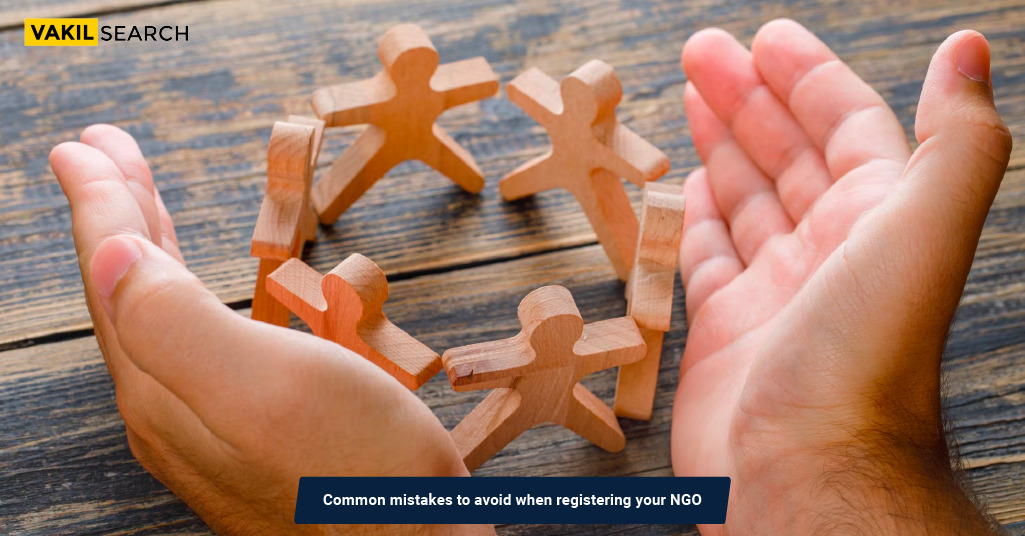Discover the pitfalls to avoid when registering your NGO. Learn from examples and solutions to streamline the registration process.
Overview:
Setting up a non-governmental organisation (NGO) is a noble endeavour aimed at making a positive impact on society. However, the process of registering an NGO can be intricate and challenging, often leading to entrepreneurs making critical mistakes. In this article, we’ll shed light on the common mistakes that individuals or groups make while trying to register their NGOs. We’ll delve into each NGO Common Mistakes, provide relevant examples, and offer practical solutions and best practices to steer clear of these pitfalls.
Introduction
Registering an NGO involves legal, financial, and administrative procedures that demand careful attention to detail. Entrepreneurs need to navigate the regulatory landscape and adhere to specific guidelines to ensure a smooth registration process. Unfortunately, several common mistakes can thwart these efforts. Let’s explore them in detail and understand how to avoid them.
Mistake 1: Inadequate Research and Planning
NGO Common Mistakes Example: A group of individuals passionate about education initiates an NGO without thorough research on existing NGOs with similar objectives. As a result, they struggle to find their niche and face competition.
Solution: Conduct Comprehensive Research
Before establishing an NGO, research existing organisations within the domain you plan to work. Identify gaps or areas where your NGO can create a unique impact. Develop a well-defined mission and vision, clearly outlining how your NGO intends to address the identified needs.
Mistake 2: Neglecting Legal Compliance
Example: An entrepreneur, eager to start operations, overlooks legal formalities such as obtaining necessary permits and approvals. This oversight can lead to penalties or even closure.
Solution: Prioritise Legal Compliance
Understand the legal requirements for registering an NGO in your country or region. Adhere to these requirements meticulously. Seek legal counsel if needed to ensure all paperwork, permits, and approvals are in place before commencing operations.
Mistake 3: Lack of Clear Objectives and Focus
Example: An NGO initially focused on environmental issues diversifies into multiple areas without clear objectives. This lack of focus can dilute efforts and diminish impact.
Solution: Define Clear Objectives
Establish specific, measurable, achievable, relevant, and time-bound (SMART) objectives for your NGO. Stick to these objectives and maintain a clear focus to ensure effective resource allocation and impactful outcomes.
Mistake 4: Poor Financial Planning
Example: An NGO underestimates the financial requirements for its projects, leading to funding gaps and stalled initiatives.
Solution: Thorough Financial Analysis
Conduct a detailed financial analysis to estimate the costs of running your NGO, including projects, administrative expenses, and contingency funds. Develop a robust financial plan and seek funding accordingly to sustain your initiatives effectively.
Mistake 5: Inadequate Documentation and Record-Keeping
Example: An NGO neglects to maintain proper records of transactions, donations, and project details. This oversight can lead to financial discrepancies and hinder audits.
Solution: Implement Efficient Record-Keeping Practices
Establish a comprehensive system for documenting all financial transactions, donor information, project progress, and administrative activities. Regularly update and maintain these records, ensuring transparency and facilitating smooth audits.
Mistake 6: Incorrect Selection of Organisational Structure
Example: A group of founders chooses an inappropriate legal structure, such as a trust instead of a society, causing complications during the registration process.
Solution: Choose the Right Organisational Structure
Understand the various legal structures available for NGOs, such as trusts, societies, or Section 8 companies. Evaluate each structure’s pros and cons in the context of your objectives before making an informed decision.
Mistake 7: Overlooking Stakeholder Involvement
Example: An NGO fails to engage stakeholders, such as community members and beneficiaries, in its decision-making processes. This leads to a lack of local perspective and support.
Solution: Engage with Stakeholders
Involve stakeholders from the inception of your NGO. Conduct regular consultations and gather feedback to align your initiatives with the community’s needs, ensuring inclusivity and effectiveness in your projects.
Mistake 8: Ignoring Marketing and Outreach
Example: An NGO relies solely on traditional methods for outreach, ignoring the potential of digital platforms. This limits its reach and ability to attract donors.
Solution: Leverage Digital Platforms
Utilise digital marketing, social media, and online campaigns to create awareness about your NGO and its causes. Engage with a broader audience and attract potential donors through various online channels.
Conclusion
Establishing an NGO requires meticulous planning, adherence to legal regulations, and strategic execution. Avoiding common mistakes, such as inadequate research, legal non-compliance, lack of focus, poor financial planning, and improper documentation, is crucial for a successful registration process. Choose the right organisational structure, engage stakeholders, and embrace modern marketing techniques to maximise your NGO’s impact.
NGO Common Mistakes – Vakilsearch provides expert guidance and assistance in navigating the legal intricacies of NGO registration. Our services ensure that entrepreneurs comprehend the legal requirements, make informed decisions regarding the organisational structure, and follow best practices to set up a robust and legally compliant NGO. By understanding these pitfalls and implementing best practices, with the assistance of platforms like Vakilsearch, you pave the way for a robust and effective NGO dedicated to making a lasting difference in society.




